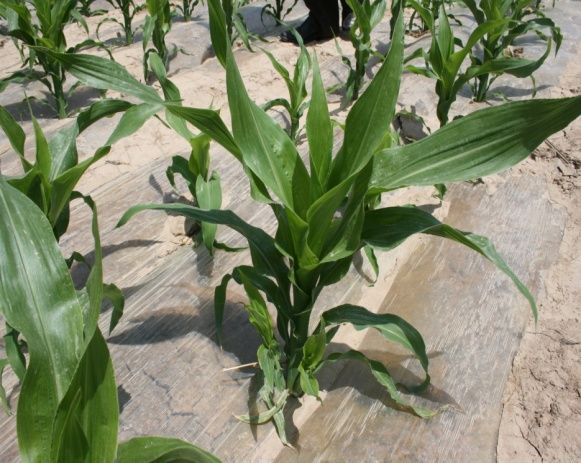Doubling yields using water-saving technology in Gansu, China
 | ||
South Gansu, located in the north-west of China in the marginal area of Qinghai-Tibet plateau, is characterized by abundant sunshine, dry climate and low annual precipitation. As a result, water shortages are the main constraints for crop production. IFAD supported the Government of China in introducing a water-saving technology invented by the Government that can double yields in the area.
Annual precipitation in South Gansu is less than 300 mm. The water shortage is worsened because more than 60 per cent of the rainfall occurs in July and August. Evaporation is relatively high, and the water-holding capacity of the soil is low.
Before the IFAD-supported South Gansu Poverty Alleviation Project (2006-2012) was implemented, farmers could only plant low-yield but drought-resistant crops such as wheat. The yield of wheat was as low as 150 kg per MU (0.07 hectares). They could not plant maize because it requires more water, and therefore could not benefit from increased prices of maize over the past years.
The project supported the Government’s new water-saving technology, whose basic premise is to completely cover the soil with plastic film. With a loan provided by IFAD, poor farmers were able to purchase the film to cover the soil. The film makes full use of the rainfall and effectively reduces evaporation. Using this technology, farmers can plant maize and potato. The yields of maize and potato are 560 kg per MU, and 1,900 kg per MU, respectively, much higher than the wheat yields. Some farmers cover all of the soil with the plastic film when planting wheat, which results in a doubling of their yields.
According to Mr Yang Qifeng, Deputy General Director of Gansu Provincial Agriculture and Livestock Bureau, “This new technology minimizes the wasting of water in terms of penetration and evaporation. Between 70 and 80 per cent of the rainfall can be absorbed by the crop.” He compared the results of two scenarios: without the water-saving technology, 1 mm effective rainfall can produce 1.5-2.0 kg grain on average; with this technology, it increases to 2.7 kg (of maize).
“We do not need to take additional action in fighting drought”, Director Duan Qibin, the Gansu Project Management Officer (PMO) said. Even in a bad year, production is guaranteed.” Gansu had severe drought in the spring and summer of 2011, but wheat yields in drought-hit areas were more than 340 kg per MU, or 5.1 tons per hectare. “Precipitation in Gansu is only 40 per cent of the national average, but the yield is equal to the national level,” the Gansu PMO and the Gansu Provincial Agriculture and Livestock Bureau proudly confirmed.
Other benefits of using the plastic film are the reduction of soil erosion, increased soil temperature and preservation of soil fertility.
The film can be used for two years. After the harvest of the second year, the film is removed from the field. In order not to pollute the environment, the plastic film needs to be collected and recycled. Currently less than half of the film is recycled. The rest is burned or buried. The Government realized this problem and has issued relevant policies to promote film recycling. The Government is also providing training to enhance farmers’ awareness of environmental protection. More recycling factories are planned to be set up close to villages. The Gansu Government expects that 80 per cent of the film will be recycled by 2015.
Weijing Wang, Programme Officer, IFAD China
Useful links:
'庫間 > 해외자료' 카테고리의 다른 글
| 라오스에서 유기농 채소 생산을 장려 (0) | 2012.08.07 |
|---|---|
| 방글라데시에서 활용하는 녹색기술 (0) | 2012.08.07 |
| 세계는 식량이 아니라 물이 부족하다 (0) | 2012.08.07 |
| 기후변화로 인해 유기농법이 적합해 보인다 (0) | 2012.08.07 |
| 보존경운이 목화농사에서 석유와 흙과 수고를 아끼게 한다 (0) | 2012.08.07 |

